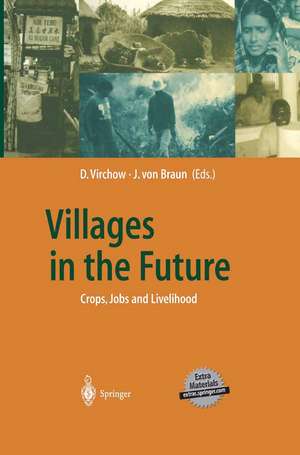Villages in the Future: Crops, Jobs and Livelihood: Global Dialogue EXPO 2000
Editat de Detlef Virchow, Joachim von Braunen Limba Engleză Paperback – 3 oct 2013
| Toate formatele și edițiile | Preț | Express |
|---|---|---|
| Paperback (1) | 951.14 lei 43-57 zile | |
| Springer Berlin, Heidelberg – 3 oct 2013 | 951.14 lei 43-57 zile | |
| Hardback (1) | 957.32 lei 43-57 zile | |
| Springer Berlin, Heidelberg – 24 oct 2001 | 957.32 lei 43-57 zile |
Preț: 951.14 lei
Preț vechi: 1159.94 lei
-18% Nou
Puncte Express: 1427
Preț estimativ în valută:
182.06€ • 197.82$ • 153.03£
182.06€ • 197.82$ • 153.03£
Carte tipărită la comandă
Livrare economică 21 aprilie-05 mai
Preluare comenzi: 021 569.72.76
Specificații
ISBN-13: 9783642627033
ISBN-10: 364262703X
Pagini: 436
Ilustrații: XX, 410 p.
Dimensiuni: 155 x 235 x 23 mm
Greutate: 0.61 kg
Ediția:Softcover reprint of the original 1st ed. 2001
Editura: Springer Berlin, Heidelberg
Colecția Springer
Seria Global Dialogue EXPO 2000
Locul publicării:Berlin, Heidelberg, Germany
ISBN-10: 364262703X
Pagini: 436
Ilustrații: XX, 410 p.
Dimensiuni: 155 x 235 x 23 mm
Greutate: 0.61 kg
Ediția:Softcover reprint of the original 1st ed. 2001
Editura: Springer Berlin, Heidelberg
Colecția Springer
Seria Global Dialogue EXPO 2000
Locul publicării:Berlin, Heidelberg, Germany
Public țintă
Professional/practitionerCuprins
1 Village Futures: Concept, Overview and Policy Implications.- 2 The Crucial Importance of Urban-Rural Linkages.- 3 The Independence of the Village.- 4 A New Vision of the Rural World’s Role in a Globalized Environment.- I. Political and Institutional Framework.- Policies to Foster Rural Development.- Introductory Statement.- 5 The Need to Reconcile Village and Globalization.- 6 Policies to Stimulate Agricultural and Rural Growth.- 7 Decentralization and Active Community Participation in India.- 8 Gandhi and Village Governance.- 9 Rural Incomes and Employment in Russia’s Transition Phase.- 10 Policies to Manage Local Public Goods in an EU Context.- 11 German Policy for an Integrated Rural Development.- 12 Potsdam Declaration Rural21.- Grassroots Movements.- Introductory Statement.- 13 The Active Rural Society in West and Central Africa.- 14 Akina Mama wa Afrika — a Women’s Development Organization.- 15 The Darewadi Watershed Development Project in Maharashtra, India.- 16 Grassroots Movements as a Means to Overcome Rural Financial Market Failures.- 17 The Barefoot Approach.- 18 IFOAM — the International Organic Grassroots Movement.- 19 SEKEM — an Egyptian Cultural and Economic Initiative.- II. Sustainable Use of Natural Resources.- Sustainable Energy Systems.- Introductory Statement.- 20 Rural Development and Sustainable Energy Systems.- 21 The Route to Sustainable Energy Systems in Germany.- 22 Renewable Energy Sources for Community Sustainability in India.- 23 Sustainable Energy Systems in Tanzania.- Sustainable Soil Management.- Introductory Statement.- 24 Balanced Fertilization: Integral Part of Sustainable Soil Management.- Land Degradation: Causes and Prevention.- 26 The United Nations Convention to Combat Desertification.- 27 Do African Soils onlySustain Subsistence Agriculture?.- 28 Natural Resource Use in Agriculture in Sub-Saharan Africa: Myths and Realities.- Enough Water for All.- Introductory Statement.- 29 Creating Institutional Arrangements for Managing Water-Scarce River Basins.- 30 More Water for Village-Based Irrigation.- 31 Access, Participatory Parity and Democracy in User Based Irrigation Organizations.- 32 Water Conservation and Demand Management in Africa.- III. Broadening the Technological Base.- Information and Communication Technologies.- Introductory Statement.- 33 The Role of Information in Rural Development.- 34 Okinawa Charter on Global Information Society.- 35 Jobs, Livelihood and Information Technology.- 36 Worldwide Access to ICT: The Digital Divide.- 37 The Phone and the Future: Village Pay Phones in Bangladesh.- 38 Local Participation in the Information Society.- 39 Telecommunications in Sub-Saharan Africa.- The Future of Agriculture.- Introductory Statement.- 40 What Can We Expect from Agrotechnologies in the Future?.- 41 Declaration of Hamburg: Meeting Future Human Needs.- 42 The Future of Agriculture in the Industrialized World.- 43 Ensuring the Future of Sustainable Agriculture.- 44 Dresden Declaration: Towards a Global System for Agricultural Research for Development.- Bio- and Crop Technologies for Agriculture.- Introductory Statement.- 45 The Impact of Biotechnology on Plant Breeding.- 46 Potential of Biotechnologies to Enhance Animal Production.- 47 Can India Afford to Ignore Biotechnological Applications?.- 48 The Conservation of Genetic Resources: A Global Effort.- IV. Urban — Rural Linkages.- Urban — Rural Linkages.- Introductory Statement.- 49 Urban-Rural Linkages in the Context of Decentralized Rural Development.- 50 Berlin Declaration on the Urban Future.- 51Employment and Migration in the Urban Future of Southeast Asia.- 52 Employment and Migration Perspectives in Africa.- 53 Reunified Germany: Separate Rural Developments.- 54 Large-Scale Creation of Sustainable Livelihoods.- 55 Urban World — Rural World.
Textul de pe ultima copertă
Life in rural communities is bound to change with historically unprecedented speed in the coming decades. How will this change be guided by local, national and global policies in order to enhance the livelihoods of rural inhabitants and to overcome the growing division of rural and urban areas? The contributions in this publication, ranging from scientific papers to short reports from practitioners, are grouped around four major themes: political and institutional frameworks to foster rural development; natural resources management and related actions; broadening the technological base of rural economies; and improved linkages between urban and rural areas. The overall message is unanimous: there is a promising future for the rural areas worldwide if adequate policies can be enforced and more efficient and fair institutions can be created.
Caracteristici
The provision of food, the preservation and sustainable utilization of natural resources as well as the development of working and living conditions in rural areas are among the main challenges of the 21st century These challenges and potential solutions will be discussed from different perspectives Includes supplementary material: sn.pub/extras












